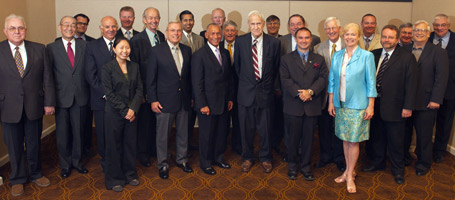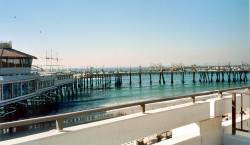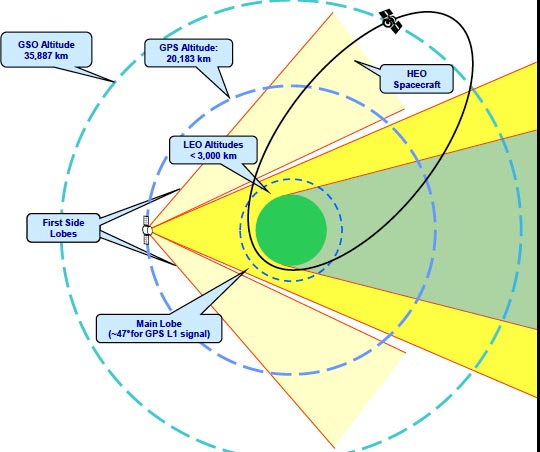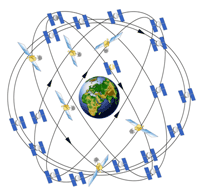To help counter pressures from federal budget cutters and wireless advocates searching for more broadband spectrum, the National Space-Based Positioning, Navigation, and Timing (PNT) Advisory Board is crafting a study documenting the economic benefits of GPS.
“We have a new assignment . . . to discover and disclose the economic contributions of the Global Positioning System,” Chairman Jim Schlesinger told the board at an August 15, 1012 meeting of the advisory board.
To help counter pressures from federal budget cutters and wireless advocates searching for more broadband spectrum, the National Space-Based Positioning, Navigation, and Timing (PNT) Advisory Board is crafting a study documenting the economic benefits of GPS.
“We have a new assignment . . . to discover and disclose the economic contributions of the Global Positioning System,” Chairman Jim Schlesinger told the board at an August 15, 1012 meeting of the advisory board.
Support for the study was requested by the National Executive Committee (ExCom) for Space-Based PNT. Although the focus would be on the United States, Schlesinger said, it would include a look at economic impact of GPS on the rest of the world. Expected to take more than a year to complete, the study needs to produce relatively speedy results, according to the board’s discussion — which could limit the scope of what is possible.
A qualitative answer, however, “should be sufficiently satisfactory to give the ExCom material to persuade the U.S. Congress to continue to provide funds,” said Schlesinger.
The analysis should also provide ammunition in the fight to protect GPS frequencies. The battle over spectrum was brought into sharp focus last year by a push to build a high-powered broadband network utilizing frequencies adjacent to those used by GPS. Though tests showed the LightSquared system would dramatically interfere with GPS receivers, and the Federal Communications Commission has effectively frozen the project, the navigation and timing community expects to have to mount a long-term defense against other spectrum incursions.
The most immediate concern remains the LightSquared project, on which a final decision is still pending. In fact, a consultant to LightSquared was in the audience during debate over the economic benefits study.
Even if the LightSquared issue is settled in a GPS-friendly way, perhaps by LightSquared successfully securing a spectrum swap that moves it to another less-intrusive frequency band, other proposals are likely to emerge. The White House is on a well-publicized hunt to find 500 megahertz of spectrum to support the growing market for broadband, and an ongoing debate continues between the ExCom and the National Telecommunications and Information Administration on setting standards to pave the way for broader use of RF bands adjacent to GPS and other GNSS services.
“Today’s meeting is focused on gaining and understanding of the economic benefits derived from GPS services and applications,” said PNT Advisory Board Executive Director James Miller, “So, the next time a new ‘killer app’ emerges to share the spectrum environment, policy makers and regulators will be better informed to make the full trade space analysis that needs to take place before some GPS applications are to be put at risk”
Board member and former Wyoming governor Jim Geringer is leading the study effort, although the board is not expected to do the research itself. The board has been asked to examine past research and frame a broad approach for completing the work, including recommending whether or not it should be peer reviewed and, if so, by whom.
Dated Data
Ample material exists with which to launch a new analysis. However, presentations at the meeting and board discussion made it clear that previous studies needed to be updated and/or expanded.
Economist Irv Leveson, principal at Leveson Consulting, began a two-part study for the National Coordination Office that was left uncompleted when funding ran short in the second half of 2010. Leveson said he had looked at 18 application areas, building from the bottom up.
Although data for some important applications were incomplete, he conservatively estimated that tens of billions of dollars in benefit accrued to the United States economy in 2008 from GPS products and services. Extrapolating that out to 2025, with a discount rate of 7 percent, he told the panel his research indicated a cumulative U.S. benefit of several hundred billion dollars.
The NDP Consulting Group took a different approach in a study it did last year for the Coalition to Save Our GPS. NDP researchers looked at the cost of losing GPS service, focusing on only three narrow sectors where there was more readily available data, said NDP managing partner Nam Pham. His group calculated that a full disruption of GPS would cost the three industries — precision agriculture, construction / surveying and surface transportation — some $96 billion in lost productivity, unusable equipment, missed sales, and foregone R&D.
The size of the loss is particularly compelling given that these three sectors make up only some 19 percent of the commercial segment of GPS users, according to NDP — and the commercial segment, which would include aviation and maritime users, is only a quarter of the total GPS user community. Consumers make up the largest segment, some 59 percent, of the overall community said NDP, while military applications comprise 16 percent.
The sheer size of the market was underscored this spring by a report from the European GNSS Agency that estimated the global GNSS market would grow to €244 billion ($277.4 billion) by 2020, noted Arve Dimmen, director of maritime safety at the Norwegian Coastal Administration.
Whoever is chosen to undertake the new round of research — a decision the board may be asked to weigh in on, they will have to plow through these and at least a dozen other studies to find useable, apples-to-apples data that is both defensible and compelling.
The research tasks identified so far include: 1) quantifying the scope of government and industry investments, 2) prioritizing user base critical sectors and applications. 3) reviewing past economic analyses and identifying gaps 4) deriving values from productivity gains 5) determining operational and cost impacts of GPS service disruption. They will also have to judge, among other things, whether to try to extrapolate the impact of new signals, the contribution of other GNSS systems, and the effects of emerging technologies such as intelligent transportation.
The research also needs to tell a story that people can relate to, said Geringer. “If you don’t put a face on it they won’t understand it.”
The study is not expected to get underway before this fiscal year ends on September 30. That is a good thing because the effort is unfunded. A budget will be developed through interagency discussion, said Miller, and would tap fiscal year 2013 funds.
The board is already fully engaged however, and trying to determine where to begin.
The presentations over the last two days, said Geringer, “made us realize that our task is even greater than we thought.”
Dee Ann Divis is an editor at the Washington Examiner in Washington D.C. She writes the Washington View column for Inside GNSS.






